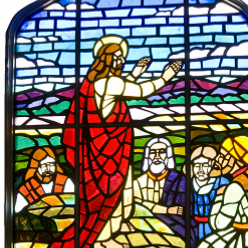Paul was an intellectual who was able to move easily at the highest levels of Jewish, Greek and Roman society, and used his background and skills to spread the good news about Jesus. He was not named Paul from the beginning, initially being named for the first Israelite king and fellow member of the tribe of Benjamin, King Saul. It is likely that he took the Roman name, Paulus, as a result of being adopted by Sergius Paulus, the Roman governor of Cyprus, whom Paul met on his first missionary journey.
Paul’s Christian vision was shaped by his experiences. We can start when he was confronted and appalled by the message delivered by Stephen to the Sanhedrin in Jerusalem. Stephen’s message, by implication, was that the temple was somehow not legitimate, or at least not adequate. To demonstrate this, he citing Solomon’s own prayer (1 Kings 8:27), and Isaiah’s question about the limited value of a physical temple (Isaiah 66:1-2). Instead of looking to the temple for the fulfilment of Jewish aspirations, Stephen pointed to Jesus as the fulfilment of God’s promise of a coming “Righteous One.” He finished his speech with the declaration that he could see (in a vision) Jesus standing at God’s right hand. Provoked by this final “blasphemy,” the witnesses stoned Stephen until he was dead.
Everything that Paul did and said after this has to be seen in the light of his experience of Stephen’s message, and the powerful effect it had upon Paul’s thinking.
Rather than just being “the youth” before whom Stephen’s accusers laid their clothes before stoning him, Paul quickly became an active agent for the destruction of the Church. He is reported to have taken prisoners of (Christian) men and women (on unspecified charges). He even went to Damascus – in the neighbouring client kingdom (probably Arabia) – with letters of authority from the Jewish high priest to take Christians as prisoners there and bring them back to Jerusalem.
As Paul was approaching Damascus, Jesus appeared to him, declaring, “I am Jesus, whom you are persecuting!”
It is clear that Jesus’ appearance to him changed Paul’s perspective entirely. We can see that Paul realized that he had been wrong in his negative reaction to Stephen’s speech. Whereas Stephen had been accused of saying that Jesus’ teachings meant changes were required in the ancient customs, Paul was soon preaching quite similar things in Damascus and elsewhere in the client kingdom of Arabia. Although his message was received with the same hostility as that delivered by Stephen, it was without immediate fatal consequences.
Many years later, Paul returned to Jerusalem, but here again, like Stephen, Paul was too hot to handle. Despite great eloquence when debating with Hellenistic Jews, the opposition to his message became too great. As a result, the leaders encouraged Paul to leave Jerusalem and to return to his home city of Tarsus, in Cilicia. He remained there for several years.
Meanwhile, in Antioch, some of the Hellenistic Jews who had been scattered outside of Judah after Stephen’s stoning began preaching to non-Jews. (This was after Peter’s vision, which led to the Roman centurion, Cornelius, being baptized and then accepted into the Christian fellowship.) Barnabas, knowing of Paul’s eloquence and gifted powers of reasoning, went to Tarsus and brought Paul back to Antioch. They became a team, teaching great numbers of people about Jesus. Following this success, the Christians in Antioch commissioned Paul and Barnabas to undertake a missionary journey, with the plan being to go first of all  to Cyprus.
Before undertaking this journey, Barnabas and Paul travelled to Jerusalem in order to confirm with the Jerusalem leaders the substance of the message that they were preaching. Here they met James, Peter and John, who acknowledged the success among the nations achieved by Barnabas and Paul, just as Peter’s success among the Jews was also acknowledged.
This was the beginning of a number of subsequent missionary journeys by Paul.
The dramatic events of Paul’s life are well documented, either through information recoverable from his own pen, or through Luke’s recounting of his life in Acts.
- A missionary journey with Barnabas to Cyprus and (southern) Galatia (discussed here).
- A broken, then restored, relationship with Peter (discussed here).
- A missionary journey with Silas through (southern) Galatia and Phrygia, on to Troy, and thence to Macedonia and Achaia (modern Greece).
- His return to Antioch, via Ephesus, Phrygia, Galatia and Judea (Caesarea).
- A missionary journey to Ephesus, and a final return to Jerusalem via Macedonia, Achaia, Troy, Miletus (near Ephesus), Tyre and Caesarea.
- His arrest in Jerusalem, imprisonment in Caesarea, and journey to Rome for his trial.
- Being under trial in Rome, while organizing delegations to other cities.
It is likely that Paul died in Rome, but the circumstances surrounding that event are not known. All we know is that both he and Peter died as witnesses to their faith in Jesus.
Bibliography
Paul Barnett, Paul: Missionary of Jesus (Grand Rapids: Eerdmans, 2008).
